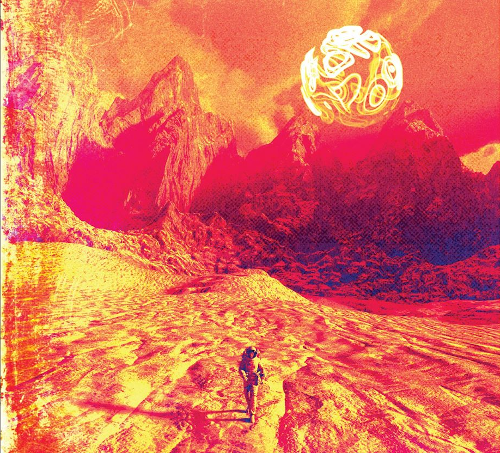April 2000
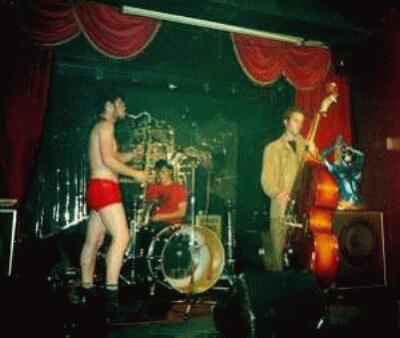
I arrived at this gig a little late and in much overdone panic. First of all we were in South London, and more importantly, I had forgotten to pick up a blank tape to record this interview on. As soon as I located Arrington de Dionyso, which took about twenty seconds in the dimly lit and tiny venue, he sweetly agreed to loan me a cassette and we got under way. Because The Vauxhall Tavern was no more than a small one room pub (with some truly , um, kitsch decor), we took our leave and went out to Old Time Relijun‘s van with the rest of the band – Aaron Hartman (string bass) and Phil Elvrum (drums) to find a little quiet to work in.
FREQ: OK, so the brief biography first-who are you?
Old Time Relijun: Arrington, Phil, Aaron
FREQ: What’s your life story in a nutshell?
Arrington: Ummmmm, well…,
FREQ: Ok, the band’s life story…
Arrington: We started out in ’95 because I had been making 4-track tapes for years and years, I had been playing all the instruments and didn’t really have anything going on as a live performer before, and it somehow happened that I bumped into the right people to play with. We had a different drummer at first who eventually decided to abandon music all together and become a dancer, and then it was really these two guys who supported me in the idea of playing live.
FREQ: Where was this happening?
Arrington: In Olympia, Washington.
Aaron: In my living room…
Phil: And the basement…
FREQ: And you were in school then?
Arrington: Yeah,
Phil: Barely!
Arrington: Phil lived in a really small town called Anacondas and we played a couple of times in a store that he worked in, and he had seen us play and actually helped us out with the shows at that point. So maybe about a year later, he moved down to Olympia and we started playing together at that point.
Phil: Arrington was the only person I really knew and he helped me find a place and all….
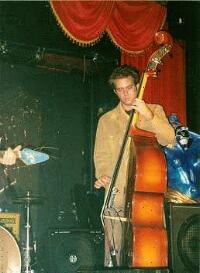 Typical sounding great American beginnings. The three boys still have a very young sort of bashful appeal to their nervous chatter. I had been to their gig earlier in the week at a proper north London venue, and so was suprised at their sweetness in person. On stage, theirs is such a barrage of aggresive noise and bizzare vocals, who would have thought it came from such all/anti-American boys?
Typical sounding great American beginnings. The three boys still have a very young sort of bashful appeal to their nervous chatter. I had been to their gig earlier in the week at a proper north London venue, and so was suprised at their sweetness in person. On stage, theirs is such a barrage of aggresive noise and bizzare vocals, who would have thought it came from such all/anti-American boys?
FREQ: Why the name Old Time Relijun?
Arrington: Actually I remember I was up one night late, playing by myself, just trying to figure out the changes in that song “That Old Time Religion” and I kept singing it over and over and each time I sang it I took it a little bit further out, of what the original song was and originally it was Arrington De Dionyso And The Old Time Relijun, for no real reason…
Aaron: It was nice to sort of think of ourselves as the backup band, and we had decided that whatever Arrington did, just to play it straight and provide not just a backdrop, but be sort of a net.
FREQ: What I got from seeing you guys play is that there is a lot of Jazz figuring not just in the musical stylings, but also in the methodolgy, does that seem like a fair analysis?
Arrington: Yeah, well we do listen to Jazz.
FREQ: And then the name suggests along with the swamp kind of sounds a taste of South-Eastern America, and you are from about the furthest place from there possible…
Arrington: Well, I lived in Arkansas for a while. There is also the kind of Gospel suggestion there, but I also like playing the sort of paradox of Old Time Relijun in a broader concept to suggest something else – a global theology, and it might have some of the trappings of the holy rollers too, the aesthetic; the swamp thing is in there, but… I don’t know…
Phil: It never seemed a very intentional thing to me. As far as I rememberwe were just recording in the studio kind of randomly, it came out sounding like it did, and then then the descriptions of the swampy sounds came out afterwards. Maybe it wasn’t really planned…
Aaron: Yeah, the plans have seemed like they were always rooted in the song, like when we record, and this might be where the Jazz thing comes in, when we record, we are recording the root basic song, and then when we play live, the songs are easy to play, and so its always easy to go away from the song, and not know where we’ll end up from there.
FREQ: So you take it as a launching point?
Arrington: Yeah, but also like stylistically, or as far as genre goes, I don’t think there has ever been a concept or a direction that we are pursuing per se, for me it is just trying to fing like the basic proto-musical ideas that I am able to work with and making something out of that.
FREQ: Do you have specific musical training?
Arrington: We are all self taught.
FREQ: And all of that vocal manipulation that you do, does that come out of somewhere, or do you get possesed or something?
Arrington: I don’t know, I don’t know what I am when I’m playing, but I definitely I am not associative in the same space. I don’t know how to define it necessarily.
FREQ: What kind of space would you say you are in when you are performing?
Arrington: Well, I have all kinds of ideas about it, I mean even within Rock and Roll I don’t feel I’m setting any precedents, I feel spirituall inspiration, sometimes I feel – especially when I am working with newer material – I feel as though I might be just a vessel, and writing things I hear up here and like I am just taking dictation, kind of like taking notes from some other world I have stumbled upon.
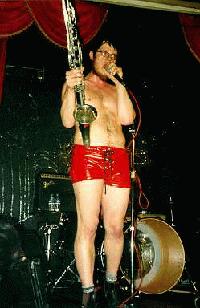 I really have never seen anything like Arrington’s performance. To say he seems possessed, is well, inadequate. He shudders and spews and makes sounds that don’t really resonate as human, and the energy is fantastic. It is really the same sort of sense one might get at some sort of holy rollers tent meeting, an enigmatic evangelist, and the shows hint at some snake handling perhaps, a little speaking in tongues…
I really have never seen anything like Arrington’s performance. To say he seems possessed, is well, inadequate. He shudders and spews and makes sounds that don’t really resonate as human, and the energy is fantastic. It is really the same sort of sense one might get at some sort of holy rollers tent meeting, an enigmatic evangelist, and the shows hint at some snake handling perhaps, a little speaking in tongues…
FREQ: So how has it been playing Europe and the UK?
Phil: This is our second and a half week, this is our halfway point.
Arrington: Yeah, we’ve got that much more to go. The tour starts and stops in Italy, because we are big there and we have a booking person there. Impressions of England, ones that I can say…
Phil: Well lets just say that our shows in England were set up quickly after some shenanigans and we were just thrown on some bills, somewhat inappropriate bills for us… and it’s really no-one’s fault.
Arrington: Well, no, it is someones fault, without mentioning names there was a person who was given responsibilty for setting up the UK shows and two weeks before we were supposed to fly to Rome, we found out that he had done nothing at all for these shows so it had to be taken over.
Aaron: Luckily, and I emphasize that, luckily, people were able to do us a favour, and throw us on some bills that were already scheduled to happen so though our name might not have been on the bill or whatever, we could play. So it is kind of hard to compare our English shows to say like Italy…
Arrington: …Which we had been promoting for months, and they really did amazing work for us, everyone. The three shows we played there so far were packed and had huge crowds.
Phil: In Rome there were people in front who were singing along to every song!
Arrington: There was even a guy singing along with stuff from the first album (Songbook Volume 1), maybe he got it from the Internet, but that is really hard to get in Europe.
FREQ: Was that the reason you did the La Sirena de Percera EP in Spanish, Italian and Portugese?
Arrington: The song I did first was the one I did in Spanish. Always in school when I was taking Spanish, we always had these weekly presentations and I would always try to write songs in Spanish for mine. I grew up in a bilingual household on my mother’s side and I like the idea of working with different languages. The song that I translated into Spanish, “Casino”, word for word there were things that just fell perfectly into place, and offering rhymes in Spanish that weren’t even there in English, and things that sounded better than the English version to me. The song in Portuguese already had a Brazilian sort of flavour taken to our extreme level, then the song in Italian – I don’t know…
Phil: The songs sound better.
FREQ: Those are the first songs I heard, and to me they sound absolutely perfect in those languages, they’re amazing.
Arrington: I mean also, it kind of shows some of my other interests. I am interested in translation as an art form, for poetry, in and of itself. About a year ago I was reading translations of biblical fragments and ancient texts, and learning how the interpretations could vary according to the translations, and that is something I really want to keep working with. I am working now on adapting some very bare fragments of Mesopotamian texts from 2000BCE, but making them totally my own. I’m not sure how it is going to work at this point, it’s something I am playing around with.
FREQ: You say you are using the texts from the Bible, is there a religious element to what you’re doing or is that more just an interest in religion?
Arrington: I think there is a mysticism in my lyrics, there is a spiritual presece and maybe the words allow for a world that allows magic to exist so…
Aaron: Arrington wrote a book a few years ago, and without having known the lyrics of the songs from the first album, it wouldn’t have made any sense to me at all, but knowing the characters from the album, the book ended up flushing out this mythology that I hadn’t really understood that Arrington and his child had sort of created. Then some of the songs that I had been playing for a couple of years already suddenly made sense and it was heartbreaking to understand the songs in that way. I think there is a mythological essence to the words.
FREQ: It seems you are making music that is in a kind of timeless framework , rather than being genre related- Jazz or whatever- so that also seems to come over from what you are saying about they lyrics. Also there is much more beyond just some songs. Having just heard the songs first, it gives a lot of depth and you saying that you have intention behind it, it makes for a whole different dimension.
Arrington: Some say I write songs about myself, and as a self the world encompases more than just what we see when we are awake; there is a circular continuum. I don’t want to come off as too New Age, (but) I don’t even keep a diary that says what I do from day to day, more like what I do awake or what I do asleep.
FREQ: With the books and the drawings, there is something very uncanny about them, are they drawn from dreams?
Arrington: Not reallly dreams as such, some of them are coincidences, its like true art doesn’t just come to you… it’s quite difficult to get things out sometimes. The concept of the dreamworld is the most familiar approach to it but what I mean is I guess being able to be more open to more shadowy bits.
FREQ: And what do you want your audiences to make of your songs?
Aaron: We get to certain moments, we get to certain spaces where it really feels like we are communicating this pattern inside.
Arrington: It is not something that can be forced, so I just have to be happy when it happens…
FREQ: So is the performance the ultimate expression?
Arrington: I suppose, they are kind of like different art forms. The way I play, there are reasons, they are simple for a reason, to allow for other things to happen.
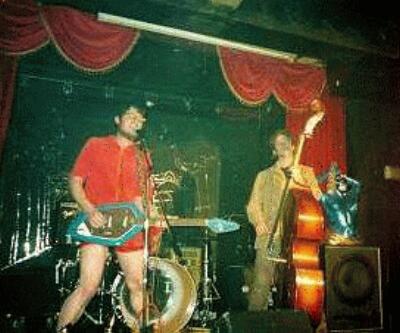
FREQ: What comes out next?
Arrington: As I said before, I work with fragments, so I have fragments that are about ready to be put together into new compositional structures, I think the next project will be probably working more intensely in a collabrative way, especially with the music, and then I will be going back over it and really draw out the most I can for the words.
Aaron: We might do some remixes.
FREQ: Where do you want Old Time Relijun to go?
Arrington: Someone said that the idea of the artist having to reinvent themselves all the time is really a Capitalist notion. I guess on this tour we we have been talking among ourselves about the fact that we are musicians and as musicians we are workers, this is the work that we do and we are pretty comfortable and confident in the way that we work. I don’t see any reason to change that, we all have other projects we are involved in but together we will just carry on.
FREQ: What are the other projects?
Arrington:  Well, Phil is Microphones, I have another project called AbraxaSaxophonicSmoothJazzVagina, which really reinvents Jazz, using a Jazz vocabulary but taking it as far out as it gets.
Well, Phil is Microphones, I have another project called AbraxaSaxophonicSmoothJazzVagina, which really reinvents Jazz, using a Jazz vocabulary but taking it as far out as it gets.
Aaron: Say it…
Arrington: What?
Aaron: No! No! say it! “I have reinvented Jazz”
Arrington: I, I think I have. Basically, what it is – I tune into a smooth Jazz radio station and I get the signal just right so that it is really fuzzy and I amplify that, and then I play bass clarinet over it. I’m working on what will be a twenty-two volume set of that and eventually a live tour.
FREQ: Are you going to just tune in wherever you go to a station?
Arrington: Ideally it would work like that, but unfortunately there are some locales which don’t have the benefit of a smooth Jazz station.
Well, hopefully a lot more locales will have the benefit of hosting Old Time Relijun. Seeing them for the second time in a week, I was pleasantly suprised to see quite a lot of variance from one show to the next. The glory being that Arrington donned red vinyl hot pants and a set of devil horns at the Vauxhall Tavern show. Prtty appropraite for the venue, really. This is not a band who would ever let their audience get bored. Very nice to not feel like I was watching the same choregraphed and edited sketch I just seen a few nights before. There was still that same level of strangeness, the odd Pentecostal moment, some intense energetics. It will be most interesting to see if Arrington does actually re-invent Jazz. With any luck the rest of the world will become as appreciative of Old Time Relijun as the Italians seem to be, and we will all get to see more of them. (Of course those hotpants were revealing, and I still owe them a tape!)
-Lilly Novak-
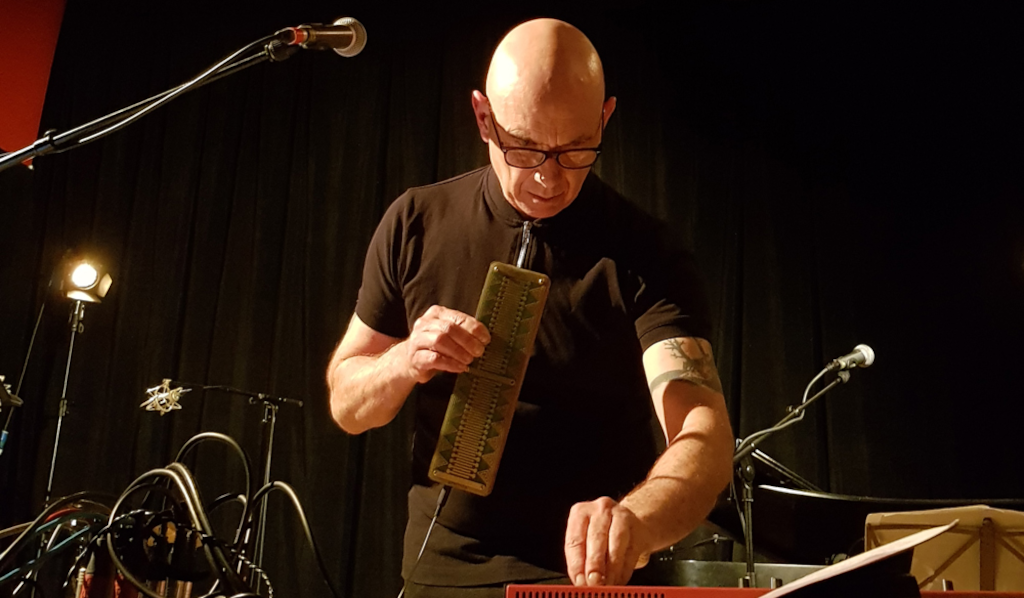
![Chilly Gonzales and The Musical Truth [with numerous others] (live)](http://freq.org.uk/wp-content/themes/customizr/assets/front/img/thumb-standard-empty.png)
